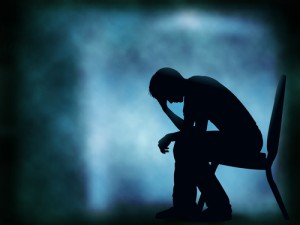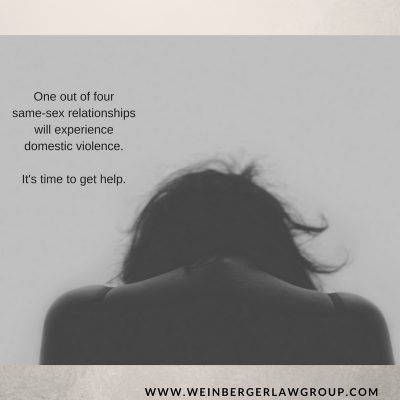Domestic Violence in LGBTQ Relationships
 Every victim of domestic violence counts and domestic violence doesn’t discriminate. We may be accustomed to talking about abuse as an issue between heterosexual partners, but abuse can and does occur in all types of relationships, including gay, bisexual, lesbian and transgendered. How can these underrepresented groups reach out for help — and what kind of support is available? As part of October’s Domestic Violence Awareness Month, let’s start a much-needed conversation…
Every victim of domestic violence counts and domestic violence doesn’t discriminate. We may be accustomed to talking about abuse as an issue between heterosexual partners, but abuse can and does occur in all types of relationships, including gay, bisexual, lesbian and transgendered. How can these underrepresented groups reach out for help — and what kind of support is available? As part of October’s Domestic Violence Awareness Month, let’s start a much-needed conversation…
LGBTQ Victims of Domestic Abuse: Tactics of Abusive Control
According to the National Domestic Violence Hotline (thehotline.org), abusive partners in LGBTQ relationships use the same tactics to gain power and control as abusive partners in heterosexual relationships—physical, sexual, or emotional abuse, financial control and more [See Signs, symptoms and help of domestic abuse]. However, abusive LGBTQ partners also reinforce their tactics that maintain the control with societal factors that compound the complexity a survivor faces in leaving or getting safe in a LGBTQ relationship.
Such tactics that are specific to LGBTQ abusers are:
– “Outing” a partner’s sexual orientation or gender identity. Abusive partners my threaten to “out” victims to family members, employers or community members.
– Telling the victim that no one will help them because they are gay, lesbian, bisexual or transgendered or that, because of their orientation, they deserve the abuse.
– Portraying the violence as mutual or even consensual or as an expression of masculinity or some other “desirable” trait.
Another tactic of control is the threat that speaking out will bring shame to the LGBTQ community. As Tre’Andre Valentine, Community Programs Coordinator at The Network/La Red, a Boston-based domestic violence support group specifically for LGBTQ people, has said, “There’s the idea that we’ll be airing dirty laundry. It sort of discredits the community to say that abuse is happening, after all the work we’ve been doing [to enter mainstream society]. There’s the feeling that we don’t want to attach something additionally bad to us, so it’s not talked about.”
The CDC’s 2010 National Intimate Partner and Sexual Violence Survey, released again in 2013 with new analysis, reported that the lifetime prevalence of rape, physical violence or stalking by an intimate partner was 43.8% for lesbians, 61.1 percent for bisexual women and 35 percent for heterosexual women, while it was 26% for gay men, 37.3 percent for bisexual men and 29% for heterosexual men. This study refuted the myths that only straight women get battered, that men are never victims or that the woman is never the batterer.
Protections & Help for LGBTQ Victims
Legally, all states in the United States offer protections for victims, either in through the criminal court system, or through the family court system, in the form of restraining orders. According to Bari Weinberger in an article on male victims of domestic violence that she authored for the Huffington Post, “Restraining orders are often the most significant legal remedy available to abuse victims, and can be obtained regardless of gender. When it comes to other domestic violence statutes, most states (approximately 37) have laws that use gender-free language.” In New Jersey, same-sex domestic partners (whether married or not) are covered under New Jersey’s Prevention of Domestic Violence Act. Find out how to get a Temporary Restraining Order in New Jersey.
If you are in an abusive situation, help is available. S.A.F.E. in Hunterdon County, New Jersey is a great local resource for LGBTQ victims of domestic abuse. Their services include a 24/7 hotline, court accompaniment for restraining order proceedings in family court, free individual or group counselling and creative art therapies. S.A.F.E. is attempting to obliterate the barriers that LGBTQ victims face when seeking services, such as societal anti-LGBT bias, lack of appropriate training regarding LGBTQ domestic violence and the misnomer that many have that domestic violence simply does not happen outside of heterosexual relationships.
Other resources that offer help are:
- The National Coalition of Anti-Violence Programs: (212) 714-1184 or www.ncavp.org
- GLBT National Help Center: (888) 843-4564 or www.glbtnationalhelpcenter.org
- Gay Men’s Domestic Violence Project (800) 832-1901 or www.gmdvp.org
If you need immediate help, The National Coalition Against Domestic Violence has full details of what to do and domesticshelters.org has contact information for local help and shelters near you. Alternatively call National Domestic Violence Hotline at 1-800-799-7233 (SAFE).
For help applying for a restraining order, or to discuss legal matters related to domestic violence, including temporary child support, alimony, or child custody, please contact us today to schedule your free confidential consultation.
Read More:


